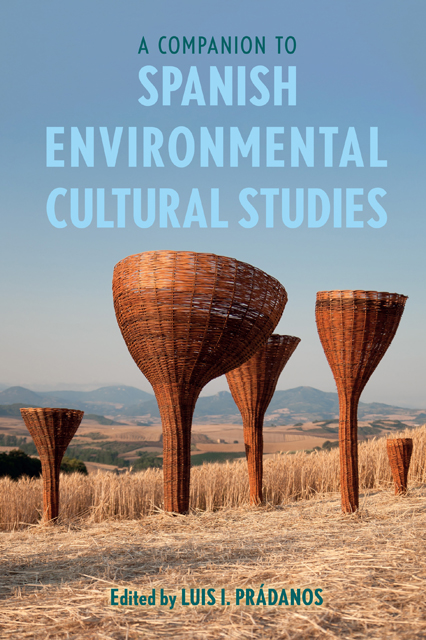Book contents
- Frontmatter
- Contents
- List of Illustrations
- List of Contributors
- Note on the Translations
- Acknowledgements
- Introduction: Spanish Environmental Cultural Studies
- Part I Environmental Cultural History and Political Ecology
- Part II Water and Power
- Part III Ecologies of Memory and Extractivism
- Part IV Animal Studies and Multispecies Ethnographies
- Part V Food Studies and Exploitative Ecologies
- Part VI Ecofeminism
- Part VII (Neo)Colonial and Racialized Ecologies
- Part VIII Tourism and the Environmental Imagination
- Part IX Eco-Mediation and Representation
- Part X Trash and Discard Studies
- Bibliography
- Index
26 - Everything is Rubbish/Nothing is Rubbish: Basurama and the “Trashformation” of Public Space
Published online by Cambridge University Press: 08 June 2023
- Frontmatter
- Contents
- List of Illustrations
- List of Contributors
- Note on the Translations
- Acknowledgements
- Introduction: Spanish Environmental Cultural Studies
- Part I Environmental Cultural History and Political Ecology
- Part II Water and Power
- Part III Ecologies of Memory and Extractivism
- Part IV Animal Studies and Multispecies Ethnographies
- Part V Food Studies and Exploitative Ecologies
- Part VI Ecofeminism
- Part VII (Neo)Colonial and Racialized Ecologies
- Part VIII Tourism and the Environmental Imagination
- Part IX Eco-Mediation and Representation
- Part X Trash and Discard Studies
- Bibliography
- Index
Summary
Trash is a complex reality that constantly shifts from the abstraction of philosophy to the concreteness of everyday life and back (Amago; Bennett; Douglas; Ferrell; Hawkins; Humes; Pardo; Prádanos; Strasser; Thill; Zubiaurre). The concept of the “discarded” is deeply subjective. More than anything, it is in the eye of the beholder. And it is the eye and modes of perception of Basurama – a longstanding Spanish collective devoted to the study of contemporary waste production and the implementation of collaborative artistic practices around the reuse and recycling of urban refuse – that will direct the thoughts of the pages that follow. Here is how Basurama describes itself and its mission:
Basurama is an architectural and artist collective dedicated to research, cultural and environmental creation and production whose practice revolves around the reflection of trash, waste and reuse in all its formats and possible meanings. It was born in the Madrid School of Architecture (ETSAM) in the year 2001 and, since then, it has evolved and acquired new shapes. Our aim is to study those phenomena inherent in the massive production of real and virtual trash in the consumer society, providing different points of view on the subject that might generate new thoughts and attitudes. We find gaps in these processes of production and consumption that not only raise questions about the way we manage our resources but also about the way we think, we work, we perceive reality. Far from trying to offer a single manifest to be used as a manual, Basurama has compiled a series of multiform opinions and projects, not necessarily resembling each other, which explore different areas related to trash. We try to establish subtle connections between them so that they may give rise to unexpected reactions. We are not worried about its lack of unity; moreover, we believe in its evocative and potentially subversive values. Besides the visual arts in all its formats Basurama compiles all kind of workshops, talks, concerts, projections and publications. Basurama acts like a creative linking platform where different agents of the same social network come together. It has created more than 100 projects in four continents. Its base is in Madrid, but it is also formed by two representative offices in Bilbao (Spain).
- Type
- Chapter
- Information
- A Companion to Spanish Environmental Cultural Studies , pp. 269 - 280Publisher: Boydell & BrewerPrint publication year: 2023

